#not even vere can withstand
Text

Vere being confronted by the most unabashedly kind man he's ever met (adam)
#'shut the fuck up i dont care' (he does)#(adam is my second TS protag)#and god he is a ray of sunshine despite everything#not even vere can withstand#vere touchstarved#touchstarved#touchstarved game#touchstarved vere#adam#charlie's art#comic
108 notes
·
View notes
Text
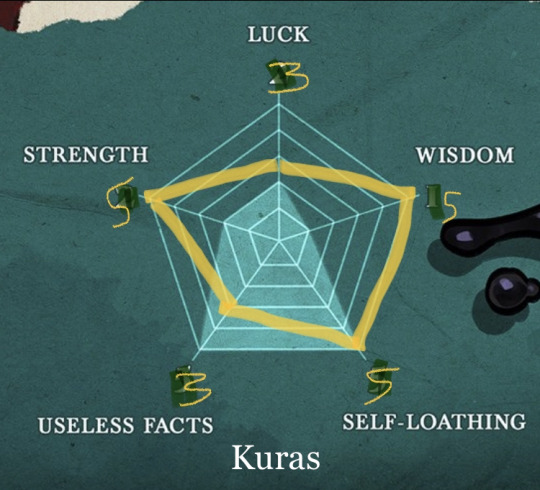
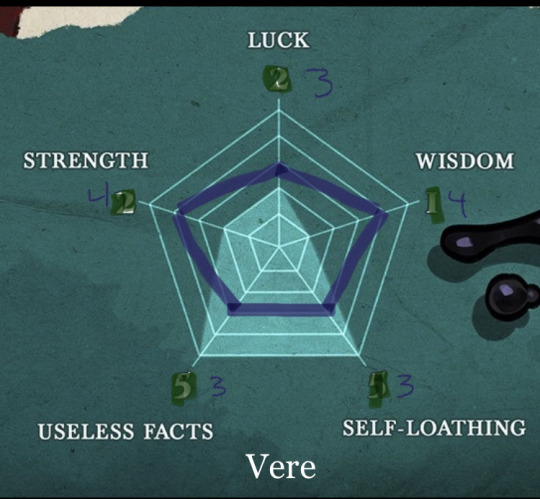
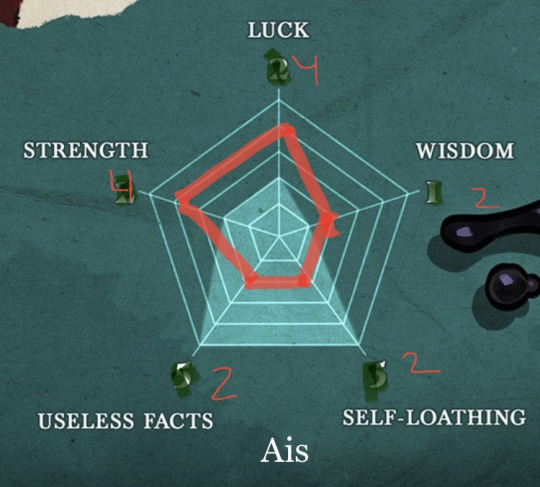
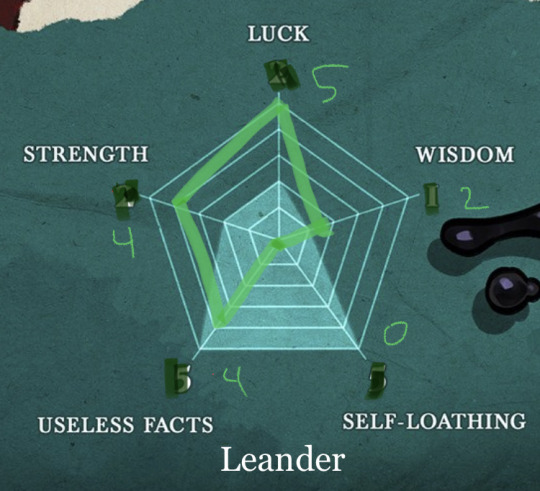
Very spur of the moment predictions before RSS might drop more of these graphs :3
Thought process below!
Kuras: ok, I feel like kuras is the biggest heavy hitter stat wise. Given that he's literally an angel, my guess is that he is very very strong. He also is hundreds of years old and is experienced with healing and .. politics? Certainly knowledge about Eridia. That means that he gets high wisdom too. Moderate useless facts because I'm sure that he's picked up plenty of info during his years in the mortal realm, but he also doesn't care about a lot of things so it can't be higher. Self loathing to the max bc he either hates what he did to get him trapped on Earth, or hates that he got caught. Obviously things didn't go according to plan for him, so luck is moderate.
Vere: he's a bit harder bc he's chained, so that limits him. I debated putting his strength at a three, as he's pretty limited, but he's also a very impressive killer - possibly more so than a regular "human" killer- or else the Senobium wouldn't find him as useful. He's afraid of Kuras's true form, and so to me that says he's weaker. Despite all of his teasing and jokes, he knows a lot of things and has a good read on the world, so his wisdom should be pretty high imo. Useless facts are moderate because he has very narrow things that he enjoys learning about (sex, music, tea..). He loves himself but I also think bitterly rues the day that he was caught, so moderate self loathing. He strikes me as fairly lucky inherently- he just pushes things further and further because of his personality, which overwhelms his natural luck.
Ais: TBH I feel like vere and Ais are comparable strength, and Ais and Leander are comparable strength, so .. they all end up at 4?^^; as they're all weaker than Kuras but stronger than Mhin. For luck- it's honestly a gamble about whether Ais made a huge mistake and doomed his gang (unlucky) OR - Sacrificed them somehow, landed a deal with a God, and now has a lot of cult followers(more lucky). Wisdom- pretty low. Ais seems to have some intuition but seems more focused on fighting first and asking questions later. Self loathing is low-i feel like he's accepted himself and the choices he's made, though in the past he may have deeply regretted them. Facts- he finds it endearing when others tell him about facts, but doesn't care about them himself and even when others tell him, he enjoys how animated they get, rather than the actual facts.
Leander: without his magic, I'd place his strength at a three. But given that his magic allows him to withstand MC's curse (and make flowers !!woot) it brings his strength up to a four^^. I feel like he is SO LUCKY because 1) he was born into wealth and power, and got a good education 2) due to his scars and rebirth icons, may have survived death, which is prettty lucky if you ask me. Wisdom- he has a good sense of how people think and act, but not that much wisdom past that. Self loathing- I think Leander thinks he's hot shit LOL Useless facts - Leander strikes me as the type of person who's always remembering details other people tell him (and seeking out more info) so that he can form connections, get to know people and get more power. He's also formally educated and probably had rich people tutoring growing up. So, useless facts is pretty high!
#touchstarved#touchstarved game#Leander#ais#kuras#vere#red springs studio#red spring studios#I'll be curious about if all the variables stay the same when/if the other characters get posted!!#some of these are based on very little info#especially luck tbh haha#I'd expect ais next if more are to come:3#mine#touchstarved theory#pls give me ur thoughts#I'm not firmly adhered to any of these metrics so I could be swayed!!
66 notes
·
View notes
Text
Thinking today about Damen, trauma and the symbolic use of water in Captive Prince...

I was talking to @zumurruds about this, and she mentioned that we understand Laurent’s trauma as readers, but that Damen’s trauma can seem elusive to us. Which is very true, and got me to thinking about how these things might work in terms of Damen’s psyche as constructed by Pacat, especially taking into consideration Akielos is a version of Ancient Greece (with some Roman influences).
Edward Tick is a fairly influential psychotherapist in the field of trauma, especially post-traumatic stress and how it affects soldiers, and he has particularly looked at Ancient Greek rituals (and other classical and indigenous practices!) for answers as to how to heal the psychic wounds of conflict.
Firstly, this is a nice overview of some of Tick’s ideas:
“[Tick’s] argument is that in classical and native American tradition, serving as a warrior was an archetypal experience characterized by initiation of young men and, then, later, rituals of purification and cleansing that help them to undergo a sort of psycho-spiritual re-birthing process and return to civilian life, not just as civilians, but as individuals who’ve gone through a profound transformation. And that transformation was acknowledged by the wider society.”
Some (not all) of these “rituals of purification and cleansing” are literally ones that use water. And I think this can maybe helps us to understand more deeply the use of water in the novels and how it connects to trauma (Damen’s in particular).
More after the jump:
Before going into more depth I will say one thing. I think the reason Damen has coped well with being a soldier, has a lot to do with his initiation into warriorhood in Akielos.
When it comes to war, specific rites and training would transform you psychologically. As Tick says:
“The study of worldwide mythology and the work of historians, anthropologists, and archaeologists show us that cultures in almost all times and places have deemed it necessary to have a warrior class of citizens. The formula is simple: the preparation is specialized training; the proving ground is battle. Risking death for the protection of one’s people transforms a boy into a warrior. Successful completion of the transformation makes him a man.”
What this does to you then is accelerate growing up. Interesting inversion there, as the Regent tries to keep the adult Laurent a child, and child Damen would have been thrust into adulthood early. Did that damage Damen? Depends on your perspective (I think yes and no), but it certainly gave him strength and resilience.
There is an interesting, revealing moment of Damen’s, when he has been flogged and still finds the wherewithal to speak back to Laurent:
“He felt raw, as though a protective outer layer had been stripped away; the problem was that what had been exposed was not weakness but core metal.”
“Core metal”. That’s what lies at the heart of Damen, even with the warmth of his heart.
Tick then quotes the philosopher William James:
“War and adventure assuredly keep all who engage in them from treating themselves too tenderly. They require such incredible effort, depth beyond depth of exertion . . . that the whole scale of motivation alters. Discomfort and annoyance, hunger and wet, pain and cold, squalor and filth cease to have any deterrent operation whatever. Death turns into a commonplace matter. . .”
Damen has gone through all this; this is what forged that “core metal” in him. He is a warrior, in a militaristic society. He understands well what it is like to have courage against death and to physically endure discomfort and physical pain. I think this is why he is able to take his circumstances as a slave in Vere, and survive. Every time Damen is hurt, he compares it to his training or to his past experiences, and simply withstands it, as he knows he got through it before. He endures and endures. Even the flogging. That is what warriors do; it was what he was trained to do.
This is one of the reasons his trauma is hidden away from us; at first, Damen seems to just cope with it.
The idea of warriors, too, is so different to modern soldiers, where I think a lot of our contemporary ideas around trauma come from.
Damen has killed on the “sawdust”, suggesting he has accidentally killed when training, and he has killed in battle. He also killed Auguste. The weight of those deaths were expiated somewhat by his role- he was not shamed but made elevated by them; when he returned from Marlas, he was honoured and given a hero’s welcome. Some of the trauma Tick describes modern soldiers go through, comes from them being shoved to one side and forgotten about.
Interestingly, another aspect of the trauma around modern soldiers, is the impersonal nature of killing. As Tick says:
In its ancient and ritual forms, warfare was often personal. Enemy combatants often knew each other by name, and the victor’s status was partly based upon the status of the enemy he had defeated. Homer’s Iliad records numerous tales of individual combat between contending champions whose families, histories, and reputations were well known to each other. But modern war is impersonal. Whom you fight, what their battle experience and status in their culture is, and how they are armed are all matters of chance.
Though we may think knowing who Auguste was makes it worse, from Tick’s perspective it is better. It becomes a matter of personal combat, a duel of honour- it is essentially meaningful. Damen fought Auguste to help end the battle, and symbolically, it was two princes fighting for victory. There is no disgrace or evil in that.
The problem comes with Laurent and with spending time in Vere, where Damen is no longer seen as a hero-warrior but a villain- someone immoral and shameful. One of the first things Laurent does to Damen in the baths is (very unfairly) make him feel ashamed for killing, and Damen has to protest and say it was “battle” and that “there were deaths on both sides” (which is true- Laurent conveniently forgets all the people Auguste would have killed on the Akielon side). That is a lot of what Damen has to battle through psychologically during the novel. He has no words to describe what he’s going through, was not trained for this, and again, this is why his trauma remains hidden to us.
In normal circumstances also, after he had been freed, Damen would have returned home, and would go through a process of restoration there that would help him process the trauma he went through in Vere. But by falling in love with Laurent and tying himself to him, Damen is forever in a liminal state- he cannot return home, as the two countries are one which the two kings will rule together, and he is always going to be both lover and brother-killer (he now carries the guilt of killing his brother-in-law, not an enemy prince). This contradiction needs to be resolved.
Additionally, what happened to him in Vere did not carry the honour of battle. Damen could not fight back. It was pure victimisation. That is also where the trauma lies, as well having to process how Laurent is both lover and torturer (Laurent also, needs to confront this, and what he did to Damen).
So let’s talk about water.
There is a symbolic weight that water always carries in texts- life and rebirth, purification and cleansing, rejuvenation and destruction, amongst many other things. But when considering water’s cleansing and restorative processes in conjunction with classical ideas of healing and surviving trauma, I think it becomes even more interesting.
The books abound with water. The trilogy starts with Damen in baths at Akielos, and ends the same way, a deliberately cyclical structure. A rebirth. Damen and Laurent bathe frequently; sometimes this leads to violence, such as the flogging, and sometimes it is cleansing.
However, it is The Summer Palace where the richest, most definitive moment of water is symbolically used.
In the short story, Pacat shows this complex interplay between past and present; of all of what lies between Laurent and Damen. There is no forgetting of the killing of Auguste or of Kastor, or of the flogging. The two move between deep romantic desire and discussions of their painful past, fluidly.
Another quotation from Tick feels resonant here:
Ironically, doing violence to another can be a profoundly intimate act. Larry, a captain in Viet Nam, said his life’s most intimate encounter had been when staring into the eyes of a North Vietnamese officer as they grappled, their hands locked around each other’s throats. Many veterans who have survived hand-to-hand combat talk about the erotic nature of the death struggle. The violence of battle can thus constitute a kind of reverse intimacy.
There is that strange irony at work with what happens between Damen and Laurent. Laurent, so damaged and isolated and cut off from others, first becomes close to Damen through the intimate act of violence- that’s why it’s important that he sits in front of Damen, close to him, and watches him as he is flogged in CP. It’s why Laurent deliberately baits Damen into hitting him in PG, by telling Damen Kastor killed Theomedes- afterwards his eyes are described as “glittering with triumph” as “his lips are smeared with blood” (a highly disturbing kiss with a fist, which he engineered). It’s why when they fight one another in the training room in KR, it is an important part of the carthasis they must go through in order to truly become lovers. Through violence is physical contact and those moments cut down the walls Laurent has built around himself.
But there are of course, huge consequences for that.
Damen admits he has not allowed himself to acknowledge much of what happened to him, particularly at the hands of Laurent. A lot remains behind a “closed door”. Yet what has been locked away must start to be acknowledged, for healing to take place. And this is done through water.
The idea that soldiers be purified when returning from war exists in many different cultures and has been practiced for centuries, including in Rome where “vestal virgins would bathe returning soldiers to purge them of the corruption of war”. For the Greeks, water in general was healing. What I think is interesting is how Pacat has (intentionally?) rewoven these strands of healing that comes from Ancient Greek culture and incorporated it into the texts. Water rituals restore and spiritually cleanse those who suffer harm- hydrotherapy of sorts. A lot of this, appears to be through gods and through dreams, water that is blessed that then touches the psyche.
This is how Tick describes such processes:
The mysterious process behind the whole tradition was called "temple sleep" or "incubation." Those in need of healing, from the highest to the humblest levels of society, cast off the garments of their roles in the outer world, bathed ceremonially and donned white robes, and presented themselves to the therapeutes, the first "therapists," the healing priests of the temple of Asklepios..... The god was believed to visit the supplicant through a dream, or in his theriomorphic (animal-shaped) form, as a snake or a dog. Through the theophany itself (the apparition of the god) or through one of the first "prescriptions"—for instance, "after fasting for three days, the supplicant should immerse himself in the pool of Parthenius, though it be winter, and pray to Artemis"—the healing would come.
So with no temples, gods or priests, Pacat finds an alternative.
Laurent bathing Damen, in the baths of Lentos.
It is a restoration for them both. By doing so, Laurent is putting himself into the position of a slave (giving himself the role enforced onto Damen, an eye for an eye), putting his pride to one side (kneeling, an act he also finds difficult due to trauma) and, most importantly, confronting the consequences of his actions in having Damen flogged nearly to death.
When Laurent washes the scars on Damen’s back, it is a transformative moment:
Nothing could wash away the past, but this took them both there, touching a painful truth, acknowledging it.
It was gentler between his shoulders than it had been against his chest. Flesh and self were linked. The cleansing was slow, attentive, drizzling water, then soaping his skin. It was healing something he hadn’t known needed to be healed. Like breathing, it was necessary, even as the tenderness of it was too much, gentleness where he had never expected Laurent to be gentle.
He had been braced against the lash for so long. Where he had been flayed, he was now open.
I would argue, with the absence of gods, there is only Damen and Laurent’s love, which exists as something higher, sacred, perhaps even numinous. It is a stand in for divine power, which is perhaps even more meaningful. Their love allows them that healing and rebirth, and allows them access to something higher than can move them forward. Perhaps that will keep being a journey that they do together, but it starts with this, with symbolic purification through water, and with the healing not just Laurent, but Damen, desperately needed.
Bibilography:
War and the Soul: Healing Our Nation's Veterans from Post-tramatic Stress Disorder, Edward Tick
Warrior's Return: Restoring the Soul After War, Edward Tick
The Practice of Dream Healing: Bringng Ancient Greek Mysteries into Modern Medicine, Edward Tick
121 notes
·
View notes
Note
Do you think Leander has connections with the Abbess? Mostly because it ties into the divine feminine part of his theme where Myth Leander convinced Hero that Aphrodite wouldnt want to be worshipped by a Virgin.
Which leads me to believe that Kuras telling MC to go to Leander and him being the first to touch MC could serve as a catalyst for every other route thus follows. Leander seems to be oddly possessive and wants to play himself up as much as possible, so his insertions could lead to bad endings in the game if you don't set the right boundaries with him.
Also his disdain for how Senobium treats Vere which, I feel, has something to do with his route and how he dislikes those who rob others of freedom [tying into his Robin Hood role] but will possibly stifle MC's attempts at a cure.
The tower of Senobium and the river that divides Eridia will probably play a huge part as you've said, I just wonder if Leander can swim.
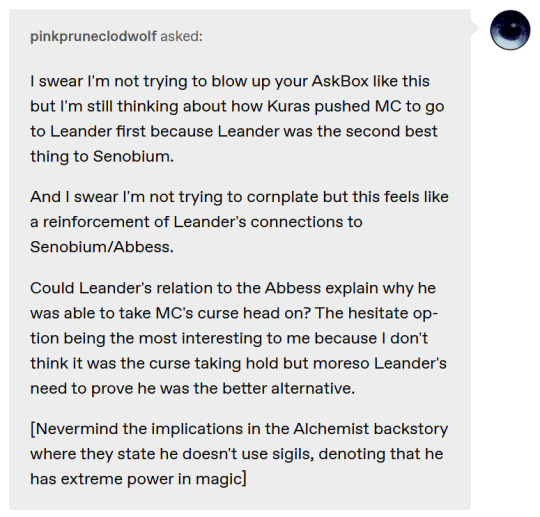
you're good, don't fret lmao. i ended up rambling quite a bit in trying to answer this and because i'm half asleep but shh but the tldr is this;
i think there is an undeniable connection between leander and the senobium, and i wouldn't be surprised if it reached all the way to the top/abbess. i don't believe, however, the connection to the senobium is why he could withstand the curse- but i do believe why he could stand the curse is indicative of his involvement level with the senobium. i also solidly believe we will need puzzle pieces of his behaviour from [potentially interfering with] other routes to reach a Best End with him.
the long rambly version [typed first], however, is as follows;
there are a lot of things that, in my mind, connect leander to the senobium. whether its because he’s working with them, attempting to undermine their rule, potentially helped found them, or something else entirely- i think it’s too early to say. we know kuras was there when leander was a child... but we don’t know when that was, either.
we also know that leander does not outright state an opinion on the senobium, even though his bloodhounds outright hate them. mind you, he doesn’t outright state an opinion on much unless trying to sway the mc one way or another, carrot-and-sticking-ing us through out most of the prologue. and he certainly says the senobium isn’t an option for mc, blatantly. but worth noting, nonetheless; on his actual opinion on the establishment, leander is silent.
leander’s background in the trailer video makes me curious. that’s a very fancy stained glass there, and i’m curious about where this takes place.
leander is the most obviously adept at using information as a currency- something that is clearly a result of the senobium’s influence on eridia- as he displays behaviours of both hoarding, manipulating, and drip feeding the information in his possession. one has to wonder how he learned these behaviours; perhaps just a result of being eridia bred and born?
leander is a notably strong mage. as you mentioned, the alchemist route comments on how he doesn’t use any incantations or spell circles to cast. (the theory of borrowed magic could possibly explain this, or perhaps it’s just magical storage he’s created for himself? and if so, how does this play into the several glowing parts of his outfit- and the differently coloured lamp on his belt, too.)
it’s curious, though. his gilded boots put him in wealth, as does his position and ability to run the bloodhounds. it could be wealth accrued from the gang, or from a history with the gang. he could be a founder or a product of the senobium- but it’s also not unknown for mages from the senobium to leave; much like MC’s teacher in the alchemist route.
but if he grew up in lowtown, left to join the senobium, and then came back to form a gang that hates the senobium- well, with how they reacted when the MC just mentioned it’s name- if it did happen, it’s certainly not common knowledge. and that wealth needs to be explained somehow.
(i’m also curious about the faction with the violet sashes noted in ais’ section near the end of the prologue. what do they denote, and where do they fall into this faction war that seems to be forming?)
i think realistically, we have too little info on the abbess to make much conclusions on anything- we have even less than we have on leander, and he’s left us with only dregs to draw conclusions from.
whatever relationship leander had with the senobium, however, i believe fully it is soured now. but i do believe there is a very relevant connection there.
all that connection fodder aside, however, i do agree that leander will be the catalyst for a lot of things. the flowers supposedly granted good luck- and repeat audience members to his show seemed very eager to receive those flowers. the line in his bio isn’t that his magic won’t save us, it’s that it can’t.
leander seemed to connect with us immediately, but i don’t believe for an instance it was a matter of just a new face in town. in a city with no walls? even surrounded by soulless as it is, i have no doubt- new faces are common enough in eridia. and yet he picked us out of the crowd. why?
aaah, i’m loosing my trail of thought here. i’m wondering what involvement leander had with our curse, if we’re looking at a hero and leander resurrection/reenactment. if it’s designed for him to withstand. or perhaps his insanity is already so present that the change was minimal for his state of mind. the devs did say the LIs are already the worst versions of themselves, come the time of canon.
someone noted that leander may be a good first route, since it was easy to unlock his red text. personally, i think leander will be the easiest to get a Good End in, because he wants to reach a Good End with us, but i think he’ll be the hardest to get a Best End in, because it means facing truths he is actively hiding away. i think we're going to have to be very particular, right from the first interaction with him, to really unlock the Best End for leander- perhaps even to the point of not unlocking the red text that's so easily available in the demo.
anyway asdlkjgfdlskf
i'm now going back and double checking what i've left unanswered asdlkjlgkdf. i wonder if he can swim too, or if perhaps he had a magical intervention to prevent himself from drowning again. perhaps a bracelet?
i think that's everything aslkjglfsdlkgjfd wow that got away with me. i'm still v disjointed with my brain thoughts at the moment, but there are so many pieces in play- and we only have the prologue to go off of. i'm very excited to see how it'll all come together adljgklf. for now, i think i'll put a tldr up the top as best i can. but yes, i have many thoughts, and no answers atm i'm afraid ;w;
(also i find it fascinating that mhin is the other potential leander eye-catcher, and their nickname from ais is dove. fascinating fascinating how the pieces fall into place.)
#personal#touchstarved#this got away from me quite a bit im sorry alkjlgkjdsljgfdsg#i need more time to stew before my thoughts can become organised enough to follow easily so. i apologise if this is hard to follow#anyway#enough of me apologising alskdjlgkjsg#this is my answer uwu#edit: stupid tumblr deleting half the links i had in this post. i tried to go back and edit in the ones i remembered being there but theres#a reason why i tag WHILE typing T__T#ts theory
28 notes
·
View notes
Text
Give Your Carpet a Second Chance and It Won't Disappoint

Do you kick people out of your life over little mistakes? No right? Then why discard your favorite carpet over small stains and spots that can be removed effortlessly? Everyone gets a second chance, and so should your carpet. It is understandable that the little stains are not so little to be neglected; hence, this is why you should consider checking out De Vere'scarpet stain removal Sunshine Coastservice, which can do wonders for your dirty carpet. If stains are not an issue but patches of colour loss are, then sit back and place your trust in De Vere's carpet spot dyeing service that will bring back colour to your carpet's life.
Tea and coffee stains, makeup stains, wine, grease, shoe and nail polish and urine are the most common stains that we deal with. Be it kids or adults, spills are usually unavoidable, but hey! Such petty things shouldn't hold the power to ruin your day so easily. Hire us and relax because no stain is stubborn or smart enough to withstand the carpet stain removal Sunshine Coastservice offered by us. Our techniques are crafted in such a way that they uplift the look of your carpet in no time. At De Vere's carpet restorations, our high-quality cleaning services ensure that no damage is caused to your carpet throughout the entire process. We promise to do what other normal cleaning services cannot if only you decide to give your beloved carpet another chance. A second chance is granted only when there is scope for fixing things. Similarly, your carpet deserves a second chance if only you plan to fix it by cleaning it. Otherwise, retaining a dirty carpet can be disastrous. Read further to learn about how a dirty carpet can impact your health negatively.
Dirty carpets- a pathway to allergies and infections
Dirty carpets might endanger our health in more ways than we think. They may appear to be a small problem at first, but they house a variety of allergens, bacteria, and even mould. When it comes to mould, the development can sometimes be undetected, which further leads to respiratory problems, also potentially aggravating existing ones. The toxins concealed inside the fibres of your carpet can cause a variety of health problems, such as asthma or hay fever, causing sneezing, coughing and difficulty in breathing. Furthermore, skin irritation and infection are something that the bacteria present in your carpet can trigger, especially in small children who spend a lot of time on the floor. If you want to keep your kids away from this filth, ensure timely cleaning of your carpet. Thus, carpet cleaning services should be done not only for aesthetic reasons but also for the betterment of our own health.
Conclusion
De Vere's carpet spot dyeing service is the best way to bring back the original colour and lustre of your carpet, and our carpet stain removal Sunshine Coast service is the perfect way to enhance the look of your carpet. Discarding shouldn't be an option when you can restore. Our expertise in carpet cleaning is remarkable, and you will have a brand-new-looking carpet in no time. Contact us today to experience the best carpet restoration services in town.
#leather cleaning near me#carpet stain removal sunshine coast#carpet repair sunshine coast#carpet cleaners sunshine coast#carpet spot dyeing#leather cleaning north brisbane#leather furniture repair near me
0 notes
Text
at night
There’s a well at the end of the road. It has been there since way before the road was built, way before Vere ever was. It runs so deep into the earth that the only proof of water being in there is the dull, thin slice of light at the bottom and the stony smell of water.
When Laurent was young, Auguste used to tell him all about the well. Built by a Goddess so in love with humankind she’d spent her days sitting on the well’s edge, staring at thousands and thousands of lights in the water, each of them a human life. With every death, a light went out. With every birth, a dim new spark took his place. But in between those moments, the Goddess cried. Her tears fed the well. The well’s water clenched humankind’s thirst.
Tears are invisible at night; no more than water, and water consumes. And no heart can withstand so much loss without breaking, not even that of a Goddess. Eventually, the tears consumed her, and the Goddess faded away.
The book that holds the tale is bound in blue leather, its pages gilded. Laurent has never touched it. But every other night, when he can’t sleep, he leaves the castle and makes his way to the well. In the dark, embracing night, Laurent sits on its edge like the Goddess used to. In the water, he sees no sparks. Only the dull twinkle of the moon.
---------
Thank you for reading! This is all I could come up with in 5 minutes, but I’ll likely develop this one.
#captive prince#laurent of vere#capri fanfiction#sort of prologue#i'll develop this one#would have wanted to write more#but the 5 minutes were up#captive prince fanfiction
29 notes
·
View notes
Text
A Minor Problem
This is a fic I wrote once for the prompt a minor problem. I chose to make it about Laurent and Nikandros dealing with an injury and naturally they make it hilarious. I’m no writer, but I’ve always enjoyed this piece so I thought you guys might too.
...
It was within a warm evening and a nearby mingling crowd that Laurent sat huddled away in a cupboard clutching his shoulder. He knew he had been too ambitious today. A certain mood had seized him and he had been training harder than usual. Unlike ever before, however, there was no impending threat. Not even a theoretical threat he placed upon himself. He was not training to battle, but rather to integrate. Damen had been putting an admirable effort towards integration in Vere. Although Damen’s stubbornness had only allowed this effort to accomplish so much, Laurent knew from personal experience that this was truly his best. He felt the need to reciprocate. Just as Damen had struggled with some Veretian customs more than others when they had spent a month or so in Arles, there were particular Akielon traditions that bothered Laurent more than others. Athletics was one of the few he was genuinely interested in. So he felt that this was his chance to make a good impression. Unfortunately, his body had its limits. A fact Laurent had forgotten all too many times. He was new to this method of training and felt that his body was by now built differently than the Akielon soldiers who were raised swimming, wrestling, and throwing. So now he sat. Cramped and hiding in a pantry near the kitchens a floor below dinner. He was determined to make it there in time to eat with the others. So he had called for the obvious choice; the only person Laurent felt was right to help him. He waited in the dark, surrounded by the aroma of baked bread and endured throbbing pain. Surprisingly, he was patient in receiving his help.
Only a few moments after being summoned, Nikandros’ cleanly shaven black head appeared in the doorway wearing his usual stone-faced expression.
“Why are you in a cupboard?”
“I hurt myself.”
“That absolutely did not answer my question.”
“Sit down.”
Rather than ask any more questions, Nikandros took a skeptical look outside the door, inched his way inside and closed it behind him. He then clambered onto the ground.
“Do you want the long version or the short version?”
“What do you think.”
Laurent nodded. “I was training. By myself. As is customary.” Nikandros nodded back. “Included in my admittedly ambitious procedure was a handful of Akielon athletics.” He scoffed. “As you know, I am not yet skilled in the fine olympic art of the discus throw.”
“You’re pretty terrible.”
“So I fell. I fell wrong and dislocated my shoulder.”
Laurent hadn’t even finished his sentence before Nikandros dipped his head down to his knees and rubbed the sturdy bridge of his nose with his forefingers. “Are you joking?”
Golden eyebrows dropped. “Yes, Nikandros, this was just an excuse to get you to chat with me in the crowded dark surrounded by baked goods. You’re too evasive of my bonding tactics so this was my plan B. I’ve even brought tea.” Laurent motioned toward some spices on the top shelf in which some jars of loose leaf blends were hiding. Nikandros delivered the same dissatisfied expression to Laurent that he was receiving. He took a breath. They remained for a moment, almost in contest to see who was less satisfied with the other. In time, Nikandros seemed to take notice of how strongly Laurent had been holding back the pain in his shoulder and asked to take a look. He cursed in Akielon when he saw it and touched at the protruding bones lightly. “Does that hurt?” Laurent snapped without turning to look at him, “Of course it fucking hurts.”
Nikandros had only seemed to take notice of how Laurent was red, damp, and shaking from withstanding the pain in that moment. He showed genuine concern in his eyes. With dutiful urgency, he told Laurent to lay down. They exchanged looks, the one Laurent received was particularly criticizing, and realized they would really have to situate themselves carefully in order to lay Laurent’s body down and stretch his arm 90 degrees to the side. This was not Ios. It was not a large pantry. They had found a position in which Nikandros had to balance himself almost entirely over Laurent’s body, and received a lofty deal of death threats about losing his balance. Once they were settled, Nikandros held a pale wrist firmly in his sun tanned, callused hands.
“This is going to hurt.” He started. He was interrupted by “I know that.” “But-” he continued sourly, “if it hurts too much, tell me. I haven’t set back an enormous amount of shoulders in my day.”
“I’m sure your skills will suffice.” Laurent choked on his words as Nikandros began to pull his forearm outward. He moved carefully and slowly, bracing himself against Laurent’s torso for extra support. Laurent took quick deep breaths. He writhed his head around in a controlled chaos and stifled any noise from escaping his lips as Nikandros set his joint back in place. When the clap of the bones had been heard by the two of them, he relaxed his grip only slightly. He was waiting for Laurent to tell him that he was in less pain. His eyes partially welling up with tears, Laurent made eye contact, nodded fiercely, and tried to lift himself up on one of his elbows.
“Woah, woah,” Nikandros let go of Laurent’s injured arm but kept his hands outstretched as if to tell Laurent to lay back down. Laurent ripped himself up anyway and slapped one of Nikandros’ hands with his healthy one. Nikandros accepted the rejection and resituated himself as well. For a moment, they sat across from each other in silence. Laurent was still taking long deep breaths with his eyes closed. Nikandros was looking at him.
“Now put it in a sling.” He said.
Laurent was shaking his head.
“Make yourself a damn sling out of your chlamys right now, so help me god.”
Laurent was continuing to shake his head. He hadn’t opened his eyes.
“You won’t be able to use it at dinner.”
Laurent shrugged. “But I will.”
“You’re just as bad as him.”
Laurent jerked his head up to give Nikandros an offended look. It was well received. They continued to sit across from each other. Nikandros picked up a bread roll from a basket nearby. He gazed around the room and inhaled the scent of fresh grain as he tossed the roll into the air.
“Why did you drag me into a closet to relocate your injured shoulder and then refuse to wrap it? Is it pride? You don’t want all those kyroi to think you’re incompetent?”
Laurent shook his head.
“What then?”
“Him.”
Nikandros let a pause carry between them.
“What about him?”
Laurent rolled his head around and partially shrugged. He still hadn’t opened his eyes. He exhaled and seemed relaxed. “You know how he is. How we are. He’ll freak out.” A pause. “This is all because you’ll worry him?” Laurent shrugged almost too dismissively, like he might have given away that he didn’t want to dwell on this topic for too long. He couldn’t help but open his eyes. He found it too pressing to assess Nikandros’ reaction. He found that he had been caught by Nikandros, whose mouth had pulled into a smile. He was gazing at Laurent, but his gaze drifted away once it was met with blue. After a moment he said, “That’s pretty fuckin’ cute.” Laurent appreciated that. He actually did. Unlike the yes-man praise he often received on his relationship by so many of the political men he knew from court, hearing praise from Nikandros was different. It made him feel welcome. Almost like it had accomplished more in the integration aspect than any show of Akielon sportsmanship could.
“You truly don’t hesitate. Or ask questions before action. I appreciate that about you.” Laurent said. Nikandros shrugged. He was still tossing his roll into the air.
“I was about to have a nice dinner.”
“I was too.”
“Were you?”
A pause.
“Look, I’m trying to get you to that dinner as fast as possible.”
“After summoning me from halfway across the fort.”
“That’s in the past.”
“As is your injured shoulder.”
Laurent smiled. “As is my injured shoulder thanks to you.”
Nikandros helped him up. It took some effort. Laurent took some more deep breaths as he stabilized his posture. Nikandros held the doorknob and didn’t let Laurent leave before saying, “Look, I have to tell him. It’s kind of my job.”
“As the best friend, I suppose that’s only natural.”
Nikandros nodded. “But I swear I’ll make it sound minimal and resolved if you see Paschal after dinner.”
Laurent put a reassuring hand on his wrist, “It was my plan. Paschal can keep secrets.”
“I’m glad to hear it.”
Nikandros swung open the door and made sure there was no audience before speed walking away from it. Laurent, understanding his measure to be discreet, waited a moment before taking up his same direction at a more reserved speed.
#laurent of vere#prince laurent#nikandros#nikandros of delpha#laurent and nikandros#fic#captive prince#capri#captive prince fic#capri fic#my writing#lamen#laurent x damen#damen x laurent
69 notes
·
View notes
Text
17 - I know who you are, Damianos
Characters: Damen, Auguste.
Tags: Post-canon. Afterlife fic. Written for @capri-month.
“I threw Vere into tumult," says Damen.
“I know you did," says Auguste. “I watched it all from here.”
Damen dies peacefully in his sleep, age 80, at the end of the harvest festival. Laurent is at his side. It is the fifty-fifth year of their reign.
When Damen dies, he finds himself in a long corridor of white marble arches. They span further than his eyes can see, illuminated so brightly that it hurts to focus on the distance.
There is something waiting for him, splintered and faint. It coheres, and comes closer, and then it becomes a someone. Damen struggles to focus on the face at first, but he cannot shake the feeling of knowing it. Something in him recognizes something in it.
Damen knows he is dead, and knows too that the figure must be dead as well. He rifles through his memory, and begins to rule out who it isn’t. Not Theomedes, whose face has almost fallen off the edges of his memory; nor his mother, whose face he had reconstructed in his imagination. Not Kastor, whose memory had never dulled; nor Nikandros, who had departed five years earlier.
He scrolls through a lifetime of faces, and comes back to one, and stops on it. When he does, the figure materializes. Or perhaps it comes into focus.
The figure is Auguste.
Auguste, laced in Veretian layers, in his brother’s starburst blue. Auguste, hair loose to his shoulders, like Laurent used to wear his. Auguste, sporting a fulsome beard the colour of dark honey, smiling quietly, his blue eyes luminous even against the white light that surrounds them.
Damen has lived a long life. He has lived three of Auguste’s lifetimes. He has fought battles and waged wars, and won them.
Still, he kneels.
Auguste looks worthy of a man’s bended knee. He carries all the grace and gravity of the throne he never claimed. Damen begins to understand, in this moment, the adoration that followed Auguste in his lifetime, and that his death only served to amplify. He also begins to understand the full force of the hatred Laurent once felt for him, for taking this away.
Damen looks to the floor. He does not know what else to do.
“Auguste.” He says, voice slipping on the word.
Auguste steps closer. Damen feels gentle fingers at the top of his head. A benediction.
“Hello, Damen.”
His voice is gentler than it had been at Marlas. His greeting is familiar, and his tone is almost fond. Damen can hear echoes of Laurent in it. With a jolt in his chest, he realizes for the first time that he has left Laurent behind.
But Damen keeps his eyes to the ground. He says “You look well,” because he doesn’t have the words for anything else. And there is so much else to say.
Auguste is Damen’s height, and closer to his build than Laurent, as solid as his brother is lithe. He looks like the king he might have been had fate not made instruments of Damen and his sword.
“Thank you,” he says, “but I always preferred my armour to court attire. I was glad to die in it.”
Gods, Damen thinks. He closes his eyes. There was no precedent for a conversation such as this one. When he lived, he had believed in the finality of death. He had never mapped out what he would say and now found himself unmoored, unsure.
“I don’t know if I can ask for your forgiveness.” He says.
“You needn’t, when you have so thoroughly earned it.”
“I threw Vere into tumult.”
“I know you did," says Auguste. “I watched it all from here.”
Damen relives that history in a moment, heart pounding. There is a silence between them, not uncomfortable, but heavy with the weight of all the things that Auguste must have seen.
“Time becomes elastic, when you die. It lengthens, and I have been here for a very long time,” says Auguste, thoughtful. He pauses for a while before continuing. “But I have watched my brother, and I have watched you. You and Laurent have built a fine kingdom between you."
Damen wishes Laurent was here to hear him say it. He wants Laurent to hear Auguste speak his name, and to praise him. His heart aches again, at the thought of this strange new existence without him.
He says, “I deprived him of you. I orphaned him.”
“You did. I know, too, that you hated him for a time.”
A wave of fiery shame washes over Damen’s face, but he withstands it and holds his tongue.
“But then, Damen, you saw him for who he was. I watched you come to realize it. I watched you deliver him to his throne, and love him as he deserved to be loved.”
“Is it enough, given what I took from him?”
It is a fear he has kept to himself for years, quietly, shielded between his hand and his heart. It is perhaps the one thing he has never shared with Laurent.
He feels Auguste’s hand come to his shoulder. His grip is firm and reassuring.
“It is enough,” says Auguste. “Rise, brother.”
153 notes
·
View notes
Text
3.8
Hyper Space
NRS Ranger
Pilot Ready Room
1000hrs
“Alright, everyone had a chance to get their act together?” Alek said but before anyone had the chance to say anything the newly commissioned pilots walked in and he said “Hey fresh meat! How’d your sims go?”
“Alright sir, I think I finally understand the landing and take off procedure!” Duc Melbun, one of the new X-Wing Pilots who appeared to be barely 17 said.
“Oh great! These were the most qualified pilots Thadmin could find?” Brawl said to Squid in a voice that could be heard by most people in the room.
“Knock it off Brawl, we're about to go into combat and I don’t need anyone to backbite right now!” Alek said
“Understood Sir!” Brawl said seriously.
“Ok, we have obtained no further information or recon yet, so get ready to fly.” Alek said “Blue Birds will launch from Launch Bay 2, and the Firebirds will also Launch from Bay 2, and Night Owls Primary Launch Bay '' Alek paused to take a short breath before delivering his final words, wondering how many men were these his last words to. “Good Hunting, I’ll be monitoring you from ops''
From there the group was dismissed to the pilots locker room that bordered the ready room. Dovinivan Castile wonders his way to his locker and looked to the one next to it, the one that belonged to Mathis (4) Rass his old gunner. Now being occupied by one of the new gunners, a big bulky Yellow skin Zabrak.
“What's your name?” Dovinivan asked
“Whats it matter? '' The Zabrak said, not even turning his head to acknowledge Dovinivan.
“Well I rather know the name of the person who I’m trusting to watch my 6” Dovinivan said squaring his shoulders forcing a confrontation.
“Its Kal, Kal Movs” The Zabrak said finally noticing Dovinivan’s threatening behavior.
Not taking his eyes off of his Dovinivan stuck out his hand “I’m Dovinivan, I’m going to be your pilot, in-flight entertainment and your only hope of coming home” he said in a threatening voice. Before Kal could respond the Alek came over the intercom
“All pilots to your craft! Repeat all Pilots to your craft”
Suited up in their blue jumpsuits the pilots rushed out of the door on the other end of the entrance to the ready room, that opened up into the Hanger Bay, a few meters from the exits stood the Chief Canton who supervised the rushing pilots and crew fueling and arming his letter birds. When the Chief caught the site of Dovinivan he took several steps with this large thick feet
“Next time you bring in a Letter bird like that Dovinivan, you will end up like that” He said gesturing toward the Y-Wing Dovinivan climbed back in when he destroyed the Stealth ship. The Y-wing was currently sitting in two parts one was the decapitated head of the cockpit. The second end part consisted of the ball turret and engine cells.
“I understand, Chief!” Dovinivan said with his hands up in defence walking away
After a few steps Kel asked “What happened to that?”
“Oh, that, my old gunner and I blew up a First Order Stealth Ship, and some shrapnel caught us on our way out!” Dovinivan said nonchalantly, trying to scare his new gunner
“That’s a tough break” Kal said matching Dovinivan nonshalness
“If you fly with me, there will be closer calls than that” Dovinivan said by this time they reach the Y-Wing Chief assigned to them.
Climbing in Kal said “Good, I’m looking forward to it”
Pausing a moment to smerk “You might just make it yet!” Dovinivan said thinking that this Zabrak just might win him over in the end.
“CAG to Air Group, Comm check?” Alek said arriving in Ops
“Tower to CAG Comm Check, Check” The Flight Control officer said
A Few seconds later
“Firebird leader, here, Firebirds Comm Check, Check” Joker said
“Bluebirds, Comm Check, Check” Noodles said
“Night Owl, reporting in Comm Check Check” Vine said.
“CAG to Chief, status update.” Alek said
“All fighters are towed to launch bays” The grand said back
“CAG to all Fighters, ready to launch?” Alek said
“Firebird, are raring to go Sir!” Joker said after checking with his squad.
“Blue Birds, are standing by” Noodles said
“Night Owls, are standing by” Vine said
“Roger Flighters stand by for jump out of hyperspace” Alek said
“ETA 1 minute 30 seconds” The Flight Control Officer said
Alek grabbed his comm and said
“All fighters are starting by Captain.”
“Thank you CAG” Captain Eggos Namin said
Several moments passed as each pilot went through their good luck rituals. Tripper touched each knockled with his opposing index finger and repeated reasons to live,
“friends to keep safe, a wife to return to, a new child to see, defend the innocent.” he switched hands
“Dead to avenge, Galaxy to save, new pilots to train,” he then paused trying to think of a final reason to live
“Soup day tomorrow?I want to live, I want to live, '' Tripper repeated constantly. He then touched the print picture of his pregnant wife and two kids, that sat in the corner of his cockpit, Alek and Joker once asked why he did not have a holo, Tripper always prefered the primitive prints of his homeworld than the technical holos everyone else had, it just felt more like home. Tripper looked at the countdown clock and it read 7 seconds. Tripper took a breath and buckled his helmet and focused on the task ahead. The clock winded down, they felt the massive deceleration, and the hanger door opened. In the front row it was Tripper, Squid and Brawl’s responsibility to go first so Tripper applied power to his engine and helped out of the hangar bay.
It took Tripper a few seconds to recognize his surroundings. He recognised the large gas planet and the several moons orbiting around it, he refocused and saw the asteroid belt the briefing mentioned. At this distance he could not make out the transport ships; he then tried scanning for the Star Destroyer but he could not see it.
“Alright head toward the large moon, were sending you the coordinates of the Transport ships!” Alek said to all the Fighters
Tripper checked his navigational display and nine red dots popped up marking the location of the nine enemy transport ships.
“Data received ETA, five minutes, do we know where that Star Destroyer is?” Joker asked.
“Negative Joker, stay on your toes” Alek said
“Understood!” Joker said back
No one broke the comm silence for two minutes then Tripper had to ask.
“Tripper to 11, so how much flying experience do you have?”
“11 to Tripper, I qualified at the academy” 11 said seriously
“which academy?” Tripper ask
“The Hosnian Prime preacadamy” 11 said
“Oh……..wow. A precadomy program” Tripper said, sounding sarcasticly impressed.
“Cut the chadder! Tripper we got the location on that Star Destroyer!” Alek said “315 mark 05 distance, 18 kilometers”
“Roger Firebird, are they launching fighters?” Joker asked
“Unknown, they just seemed to notice us same time we noticed them.” Alek said.
Sweat broke out on Tripper’s gloved knuckles, “how many Tie fighters can a First Order Star Destroyer hold?, 12 or 1,012” Tripper thought fearfully. But then he reached a decision, that he could not be scared, fear would only get in his way, fear would only get him dead, he was to drive fear from out of his head. Tripper took a deep breath and headed into the asteroid field.
While the Star Destroyer did not notice them right away, the nine transports did. They began to form some sort of a defensive perimeter and arranged themselves in a loose circle. The Ranger’s X and Y-wings zipped zoomed and drove around Asteroids, When they cleared the Asteroid field they began to mark their targets Tripper and Joker went first with all other X and Y-wings tailing behind them. Tripper looked down and flipped the switch that primed his Proton Torpedo and switched on his targeting computer. He waited a moment as his targeting computer picked out certain systems, engines, power generator, bridge, etc,
“What are we aiming for?” Tripper asked his wingman
“Were going to hit the engines' ' Joker replied.
Tripper, selected the engines and made a few adjustments to his course and let fired his red Proton Torpedo which locked on its course, a few seconds later, the shields could not withstand the power of the proton torpedo, and the explosion rocked the medium sized transport. An instant later Jokers torpeado hit home and the back half of the transport look more like a Rishian Honey Comb, than a transport. Tripper than vered from his course as a small point defence cannon on an neighboring ship opened up on the approaching Fighters. Instantly each fighters straight line flight path turned into corkscrews and sickle shapes.
“We have to locked out that ship!” Vine said into the comm “None of my Y-wings are fast enough to survive an attack run on that thing!”
“Understood Vine,” Joker said “Squid, Brawl, take that thing out”
“Yes, Sir” Squid’s Quarren voice said as he and Brawl’s X-Wing broke out of their turns and made their way toward the ship firing red laser bolts.
“Cut across their top to draw their fire I’ll come in low, and hit their power generators” Squid said
“You got it!” Brawl said a little too excited as his X-wing accelerated, When he was in range he open fired with his quad laser cannons. But the Transports cannon did not even notice Brawls strafing run, instead the point defence cannon saw through the diversion and aimed for Squid’s X-Wing.
“Squid! Break off your attack run!” but before Brawl finished Squid's X-wing was shredded.
With great prejudice, he cut power to the engines and pulled on his throttle hard, pulling more G’s than his inertial dampers could handle, he began to go through tunnel vision and his face strained to keep the blood out of his head. When his narrow pinpoint vision caught sight of the enemy transport, he cut his turn and shoved his power forward. The Transport was caught unaware that an X-Wing could pull that tight of a turn that fast, but when the gunner saw Brawl’s X-Wing he tracked toward it. But it was too late Brawl primed and fired his torpedo. His targeting computer automatically selected the point defence cannon, and the gun went silent, along with a chunk of the top half of the transport. Brawl blackout for two seconds, but when he came to he fought his remaining head rush, but when his head quilted he saw that he was headed toward the asteroid field, he gently turned his X-Wing back to the battlefield, he saw that three other transports were destroyed leaving four undamaged transports.
“There is an opening in the Asteroid field and it looks like the transports are trying to use it” Vine said
“UNDER NO CIRCUMSTANCES let any go! If even one transport gets through the Fondor System will have to fight that many more StormTrooper and blasters.” Firebird said through the comm.
The Y-Wing pilot Dovinivan Castile or Credits saw the X-wing pilot explode but he also saw the opening Vine reported, he also saw the transports making their way toward the opening.
“I have an idea” he said to his gunner as he pulled his Y-Wing out of its path and turned toward the asteroid field
“Umm, ok?” Kal said hesitantly
Entering the closed ring of the asteroid field he zoomed over and rushed under the floating space rock. When he saw the opening he shut down his engines and waited there. When the first Transport enters the small opening, closely followed by the two more. Credits, pushed his throttle forward and engaged his engine. He ambushed the broad side of the transport and with 3 proton torpedoes disabled the ship causing a bottleneck of the little window of opportunity the transports had to escape. The two transports following the now disabled transport turned sharply to avoid a collision but that left them exposed to other X and Y-wing bombs, the night owls and Firebirds finished them off quickly. The transport Credits disabled floated there for a while until a large asteroid clobbered the transport pulverising it, flinging debris in every direction. Credit slid his Y-Wing through the remains of the transport.
“Firebird, this is Vine, all transports are destroyed!” Vine said into her comm pulling her squadron out of the attack zone.
“Heads up! Sensors just picked up a TIE Fighter Space Port on the moon.” Firebird said in the comm his high strung voice that unerved the Air Group.
“Have they launched TIE’s yet?” Vine asked
As she said that an A-Wing exploded in the distance.
“I think they have!” Noodles said angrily. Pulling his A-Wing to intercept a TIE Fighter Squadron.
“Orders from the Captain, Destroy the Space Port any means necessary,” Firebird said
“Squad, heads up! 04 degrees mark 03, heading toward the Cruisers, there is an unknown fighter craft” Joker said “Can someone identify it?”
“It is some sort of TIE variant,” Root said, zooming his X-Wing toward the craft, With his wingman Mob close behind.
“From their size and configuration I think they are bombers” Mob said
“Joker split your squadron into two, half hit that Space Port, the other half take down their bombers. Noodles keep intercepting those TIEs and keep them away from the fleet, Vine, let’s get your Y-Wings here then cover the fleet until we jump out.”
“Yes, sir!” Noodles said “Already doing it but I have already lost three Fighters”
“Yes, sir!” Vine said having her squad form up getting back to the fleet and full speed.
“Understood!” Joker said then to his squad “Tripper, Gungan, Book and I will hit the Space Port, Brawl take Sabbac, Drip, Mob, Root, 11, 12”
0 notes
Photo
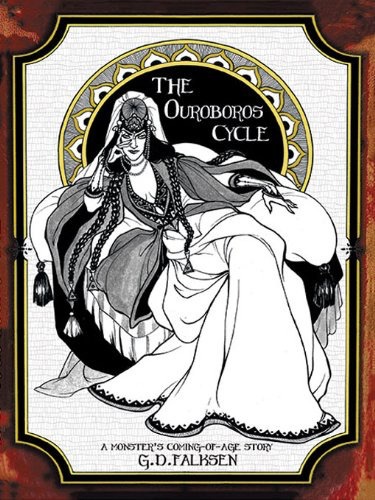
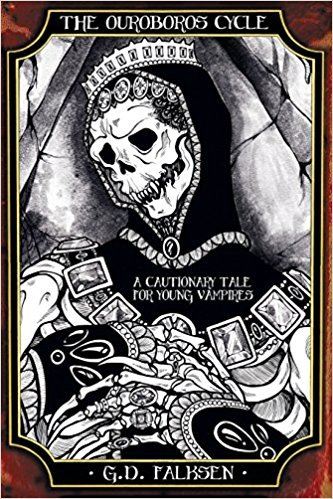
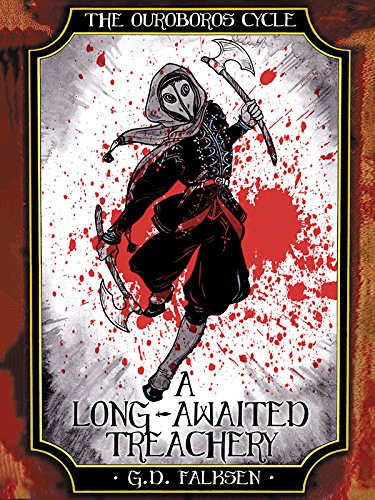
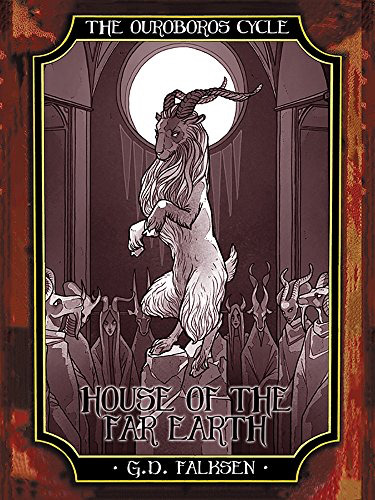
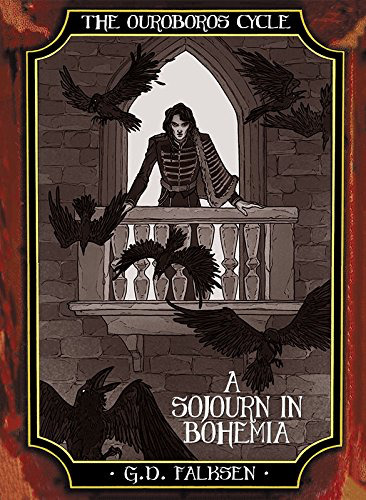
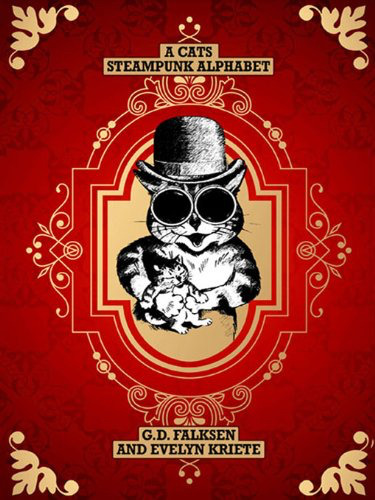
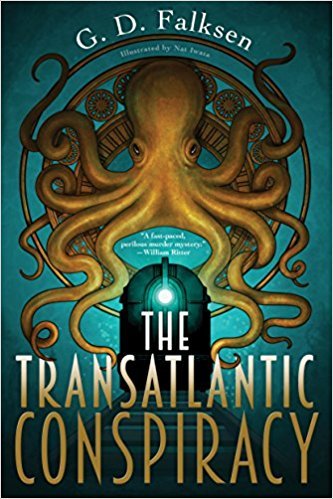


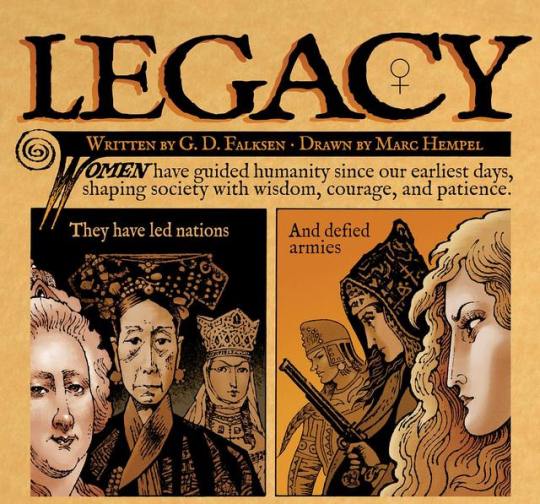
Books that I’ve spent years writing just for you
You get fun things and I get to eat. https://www.patreon.com/gdfalksen
The Ouroboros Cycle on going series
You can get all five books in the series so far on ebooks for less than twenty dollars, but if you are someone who needs the physical book it's also available.
The Ouroboros Cycle, Book 1: A Monster's Coming of Age Story
https://www.amazon.com/gp/product/B00B1TIUBU/ref=series_rw_dp_sw
How far would you go to avenge the one you love? Would you go beyond death? Born into the stifling confines of French upper society, Babette Varanus never thought that she would have to answer that question. Surrounded by wealth yet ostracized by her peers, Babette had little interest in love until she met Korbinian, a scandalous German baron with the audacity to regard her as his equal. But when the intrigues of her grandfather's enemies conspire to tear them apart, Varanus will embark upon a journey of vengeance, love, and redemption that will take her beyond the limitations of mortality and reveal to her the dark forces that command humanity from the shadows. Faced with madness, murder, hidden cults, and erudite vampires, does she have the strength to withstand the storm that rises against her?
The Ouroboros Cycle, Book Two: A Cautionary Tale for Young Vampires
https://www.amazon.com/Cautionary-Young-Vampires-Ouroboros-Cycle-ebook/dp/B00JVA07P8
The year is 1888 and a madman is terrorizing the East End of London. But Doctor Varanus Shashavani has far more pressing concerns to worry about than a lunatic in Whitechapel. Her charitable hospital is under siege by gang lords, her English cousins are threatening to steal her inheritance, and her best friend has become obsessed with Gothic novels. To make matters worse, her son Friedrich is associating with an American who talks endlessly of wellness and yoghurt, while her bodyguard is pestering her to return home to Georgia, half a world away. It seems that everyone--friends, enemies, and “Saucy Jack” alike--have conspired to interrupt her work.
But Varanus did not obtain immortality just to have mad killers and distant relations get in the way of scientific progress. Though supernatural conspiracies and all-too-human monsters confront her at every turn, Varanus will stand firm against all odds. After all, she is accustomed to fighting for what is rightfully hers.
The Ouroboros Cycle, Book Three: A Long-Awaited Treachery
https://www.amazon.com/dp/B00VAYSWM8/ref=dp-kindle-redirect?_encoding=UTF8&btkr=1
For a thousand years, the immortal Shashavani have hidden from the world in the halls of their mountain fortress, amassing great stores of knowledge in a haven of academic tranquility. And while Doctor Varanus has never found tranquility much to her taste, even she cannot deny that the peace and quiet make for a pleasant diversion following the chaos of her recent adventures in London. Having left the horrors of bloodshed and wellness behind her, Varanus has thrown herself headlong into the study of the Shashavani condition, determined to learn the secrets of their undying power.
But all is not as it seems in the House of Shashava. As winter snow covers the Shashavani valley and chokes the mountain passes, sinister events are unfolding in the shadows. Whispers of conspiracy echo through the halls. Soon loyalties will be tested and friendships betrayed. Blood will flow. For upon the frozen steppe, an ancient evil stirs and turns its gaze toward the House of Shashava, hungering for power and revenge.
As darkness descends, one question remains:
Do you serve the Winter King?
The Ouroboros Cycle, Book 4: A Sojourn in Bohemia
https://www.amazon.com/dp/B01ERX8QGK/ref=dp-kindle-redirect?_encoding=UTF8&btkr=1
It is 1899, and Doctor Varanus is in Prague with her mentor Iosef, both still recovering from the scars of the Shashavani civil war. Iosef has found a reprieve from grief in the study of the so-called “Black Goat” cults, aided by a charming Prussian nobleman and a mysterious bookseller. Under other circumstances, Varanus might regard Iosef’s fascination with occult philosophies as troublingly superstitious, but she has greater concerns. Her wayward son Friedrich has taken up residence in Prague as well, and in the company of artists, revolutionaries, and other such rabble-rousers.
As Varanus endeavors to carry on her research and drag Friedrich back into respectable society, she discovers something sinister may be at work in the Kingdom of Bohemia. Could there be more to Iosef’s occult studies than he or his new friends realize?
Truth or fantasy, a shadow looms over Prague, threatening to drag Varanus and all she holds dear into the darkness of an unending night . . .
The Ouroboros Cycle, Book 5: House of the Far Earth
https://www.amazon.com/dp/B074R6GFLB/ref=dp-kindle-redirect?_encoding=UTF8&btkr=1
For the past year, Doctor Varanus has languished in the desert, tormented by heat and inactivity, while her mentor Iosef searches for evidence of his so-called "Black Goat cults" in the ruins of Sumeria, aided by an ambitious banker and an incompetent archaeologist. Their purpose: to unearth the lost city of Ekizu, a place only whispered of amid tales of blood sacrifice and dark gods.
But as Varanus's patience wears thin, intrigues within the camp begin to surface, threatening everything she holds dear. An evil watches from the desert, eager to claim Ekizu for itself, while old enemies lurk in the darkness, plotting revenge. And as the great temple is uncovered, they will learn too late the truth behind an ancient warning.
Better that dead things had been left buried, lest all the world fall under the shadow of the Far Earth.
The Transatlantic Conspiracy
https://www.amazon.com/dp/B015MA7RQW/ref=dp-kindle-redirect?_encoding=UTF8&btkr=1
At the dawn of a reimagined 20th century, one girl must become the reluctant symbol of a new world.
The year is 1908. Seventeen-year-old Rosalind Wallace’s blissful stay in England with her best friend, Cecily de Vere, ends abruptly when her father books Rosalind on the maiden voyage of his fabulous Transatlantic Express, the world’s first railroad to travel under the sea. Rosalind is furious. But lucky for her, Cecily and her handsome older brother, Charles, volunteer to accompany her home.
But when Charles disappears and Cecily and her housemaid, Doris, are found stabbed to death in their state room, Rosalind finds herself trapped undersea, in a deadly fight to clear herself of her friend’s murder and to thwart a sinister enemy.
The Hellfire Chronicles: Blood in the Skies
http://wildsidepress.com/the-hellfire-chronicles-blood-in-the-skies-by-g-d-falksen-trade-pb/
In 1908, the world ended in fire.
Humanity, always bad at following orders, refused to die. Now, two hundred years later, what remains is divided between civilized order and lawless frontier. For the citizens of the Commonwealth, the brave pilots of the Air Force are all that stand between them and the dreaded pirate lords of the Badlands. For generations, the two forces have struggled back and forth in an endless cycle of invasion and reprisal. Now that is about to change, and flying ace Elizabeth Steele is about to find herself dragged into a web of intrigue aimed at the downfall of the civilized world.
Nothing that a clever girl with a trusty aeroplane and a charming spy at her side can't handle.
The first book of The Hellfire Chronicles, Blood In The Skies by G. D. Falksen is a fast-paced and gorgeously illustrated steampunk adventure story set in a world of excitement, danger, and aviation. Join Wing Commander Steele of the Commonwealth Air Force as she battles mysterious assassins and bloodthirsty pirates bent on delivering a doomsday weapon into the hands of a madman.
A Cats Steampunk Alphabet
https://www.amazon.com/dp/B007W7BSPU/ref=dp-kindle-redirect?_encoding=UTF8&btkr=1
A is for Airship, for flying is keen. B is for Boiler, turning water to steam. A Cats Steampunk Alphabet is for the velocipede lover in all of us ... seen through cunning feline eyes!
Short Stories
Cthulhu Fhtagn!
https://www.amazon.com/Cthulhu-Fhtagn-Laird-Barron-ebook/dp/B0127TCT8C
The Curious Death of Sir Arthur Turnbridge, by G. D. Falksen
Eternal Frankenstein
http://wordhorde.com/books/eternal-frankenstein/
The New Soviet Man, by G. D. Falksen
The Steampunk Modern and Classic Steampunk Stories
https://www.amazon.com/Steampunk-MEGAPACK%C2%AE-Modern-Classic-Stories-ebook/dp/B00B1M129O
THE CASE OF THE PECULIAR SAFECRACKER, by G. D. Falksen
Altered States Of The Union
http://www.crazy8press.com/books/altered-states-of-the-union/
Red Harbor, by G. D. Falksen
Mine! : a comics collection to benefit Planned Parenthood
https://minecomic.backerkit.com/hosted_preorders
Legacy by G.D.Falksen art of Marc Hempel
54 notes
·
View notes
Text
GAYNASAS: 10 Romantic Opera Arias for St. Valentine's Day
Our pick of Romantic Operas
Roughly listed by accelerating degree of ...er... explicitness (ahem!) here are some exothermic opera songs to warm you up on the most romantic night of the year.
1. 'Ah! Leve-toi, soleil!' from Gounod's Roméo et Juliette:
The story is of Romeo and Juliet, of course, with the French libretto very neatly translated from the famous balcony scene of the Shakespeare play. This is Romeo entreating for his beloved Juliet to appear on her balcony like a rising sun to shine a ray of love into his life. The hot headed man may not be ideal husband material, but his burning passion to live for the moment would require quite a lovelessly cold Juliet to resist! Romeo only goes up to Bb, but that is plenty high enough to precipitate a flock of fallen angels smitten by his sheer vocal virility, I think.
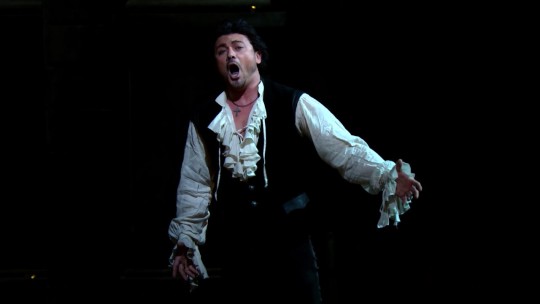
2. 'Quando m'en vo' (Musetta's waltz) from Puccini's La Bohème:
Even though the opera is about the poor love birds Rodolfo and Mimi, it is Musetta, the cattily rich vamp who spends the opera flirting with their friend, Marcello, who has perhaps the catchiest (and flirtiest) tune in the show. It is the tune that keeps popping up at various points in the film, Moonstruck, to set up a romantic scene. An obviously apt use! Puccini was a wonderfully descriptive composer when it comes to exposing a character's personality in a song. And Musetta.... she is definitely the girl who is never lack of masculine attention!
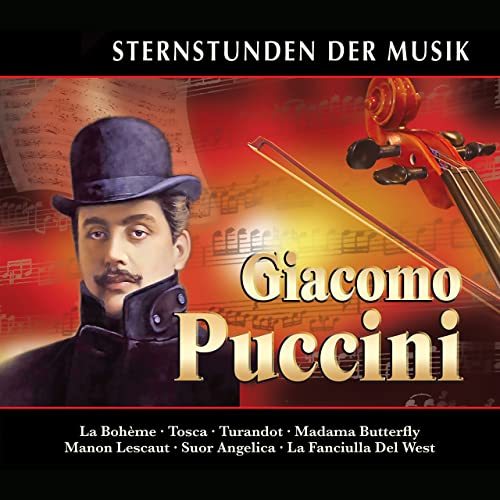
3. 'La ci darem la mano' from Mozart's Don Giovanni:
Don Giovanni (Don Juan) spends the last day of his amorous life suffering from a series of unsuccessful attempts to seduce various women... until he runs into young Zerlina, a peasant girl who is about to be married to her handsome young Masetto that very night. If you want to know how it all turns out, you'll have to rent a DVD of the opera or go catch a performance at your local opera company... Musically, though, I'm afraid no matter what does or doesn't happen on the stage, Zerlina comes away from this little duet a lot less innocent than she was going into it!
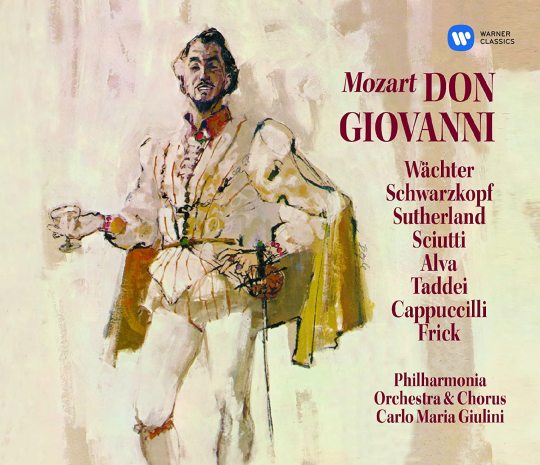
4. 'Mon coeur s'ouvre à ta voix' from Saint-Saëns' Samson et Dalila:
There is love.... and then there is lust... and then there is something even more dangerous than both; a vengeful seduction. Dalila may have entertained some romantic feelings for the heman-ly strong Samson, but a young ingenue looking for love, she isn't. And so, our splendid hair-ed hero finds himself in the third act of the Biblical-theme opera mesmerized by a siren song of a woman seduced not by his look but also by the prospect of his destruction. Isn't it terrifying how a little danger can make a woman so ...irresistable?
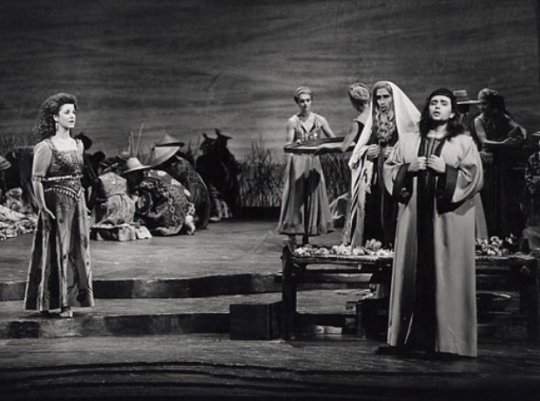
5. 'O soave fanciulla' from Puccini's La Bohème:
On the opposite of the scale from Dalila is Puccini's Mimi, a frail and kindhearted woman dying of consumption just as she finally meets her true love, Rodolfo. They are two youngsters with humble means who are looking for a long lasting romance rather than a quick fix to their passion... And that shows in the longevity of the popularity of this duet. Rodolfo is unexpectedly visited by this girl next door and invites her out... if you want to know how it resolves, click on the song title and find out! You won't even have to understand Italian to get it.
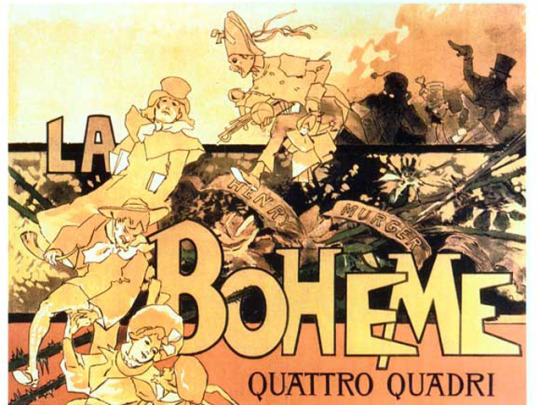
6. 'Glück, das mir Verblieb' (Mariettas Lied) from Korngold's Die tote Stadt:
This is a rather haunting song in more ways than one... Paul moves to the dead city of Bruges because he loves his recently deceased Marie too much to move on with his life. Instead, he runs into Marietta, a dancer who resembles his wife to the very shade of her red hair. His obsession with 'Marie's incarnation in the flesh' reaches a most eerie note when Marietta starts to sing him a song... that turns out to be his dead wife's favorite. It triggers a hallucination sequence that boggles the mind of many audiences and stage directors alike when this opera is performed on the stage.

7. 'Au fond du temple saint' from Bizet's Les pecheurs de perle:
Well... while there is no openly gay male character in opera that I know of (Billy Budd and Captain Vere not withstanding), there are many soaring tenor-baritone duets for our gay friends to revel about in opera. Nadir (the tenor) and Zurka (the baritone) are long lost friends who had fallen out with each other in their youth over a beautiful woman. Now that they've found each other once more, they resolve to never again let a woman come between their friendship. Anyone who have lived past his teenage years would know to take such a proposition with a (large) grain of salt, but Bizet's glorious music should make it easy to believe it if just for the moment.... until Leila shows up, that is...

8. 'Mira, o Norma' from Bellini's Norma:
Is... practically to the gay gals among us what the Pearl Fishers duet (the previous number) is for the gay guys. Norma is so incensed that her lover, Pollione, had been shagging up with her protégée, Adalgisa, that she contemplates killing herself and the children she has in secret with Pollione. Luckily, mother instinct prevents her from harming her kids... and Norma slides to the floor a broken woman when Adalgisa turns up promising to be a good friend from now on (the libretto is really a bit more suggestive for the story, but that's flowery Italian poetry set to music for you... it sometimes bears unintended interpretation).

9. 'Dome êpais, le jasmin' (Flower Duet) from Délibes' Lakmé:
Another womanly love tune between a mezzo and a soprano... Brahmin princess Lakmé and her slave, Malika, are out in the forest admiring their flowery environs, singing this song about following the river to its source. Even the non-opera fans will be familiar with this gorgeous and light as a feather tune... It is a favorite of car and luxury items commercials, and erotic scenes at the cinema... for obvious reason, I think.

10. 'Ce n'est qu'un rêve' from Offenbach's La belle Hélène:
Jacques Offenbach's operetta on the theme of 'how Helen of Sparta runs off with Paris of Troy' is a satiric commentary on the French upperclass of the 2nd Republic. Musically it is unabashly adorably x-rated (ahem!). Honestly.... the only rival for it in terms of graphic acoustic description of what lovers do on their Valentine night (while being covered in deceptively light-heartedly mild manner lyric) is Richard Strauss' overture to the opera, Der Rosenkavalier... (or, come to think of it, Salome's monologue to Jocanaan's head toward the end of his Salome). It really is a masterpiece of musical satire; so sexually explicit as to make the old fashioned listeners blush like pre-heated tomatoes, and yet so cute and light that it keeps even the most uptight of nuns and peres watching and listening. O well... how dull would a Sunday confession be if not for some guilty pleasures like this little duet to spike up your reverie with, ay?
So, these are a few samples of what loveable fun you and your significant other can have at the opera. Check out the local opera company near you and see if there isn't a good show to drop in on this month. Who knows? Maybe you've been an opera fan all these years without realizing it!

1 note
·
View note
Text
Elte - 2019 Outdoor Furniture Collection
Just in time for a return to “slightly” warmer weather, ELTE’s outdoor furniture collections have just arrived in the Castlefield Design District showroom. Effortless, modern, stylish…and ready for spring delivery :)
Below is a small selection of the outdoor furniture you can find at ELTE.
MR-1 COLLECTION
World-renowned, multi-awarded designer, Mario Ruiz’s newest offering is an ode to his childhood in Spain, when everything was simple and easy-going. The clean, angular designs are a masterclass in craftsmanship, making them tailor-made for Canada’s climate. But stylish as they may be, his hope for these pieces is to “help people enjoy wonderful moments under the sky.”
EXO COLLECTION
Los Angeles-based Ann Vering believes that design is poetry in motion. With an education in architectural engineering, the high style and sophistication of her new EXO range will enhance any outdoor space, and is built to withstand whatever mother-nature throws at you.
HAYMAN COLLECTION
Sydney-born designer brothers Nicholas and Harrison Condos have always been inspired by their home country; their latest collection is no different. Inspired by the low, clean lines of contemporary coastal Aussie architecture, it is meticulously designed to withstand even the harshest Canadian elements.
Elte is one of Toronto's premier retailers of outdoor furniture, hardware, office furniture, storage furniture, bedroom furniture, lighting, seating, rugs & carpets, tables , media furniture and home decor accessories.
Elte is located in the Castlefield Design District at 80 Ronald Avenue
0 notes
Text
Fourth Lenten Sermon of Fr. Cantalamessa to papal household: Full text
(Vatican Radio) The Preacher of the Papal Household, Fr. Raniero Cantalamessa, O.F.M. Cap., gave his fourth Lenten Sermon to Pope Francis on Friday morning in the Redemptoris Mater Chapel.
The theme of the Lenten meditations is: “No one can say, ‘Jesus is Lord’, except by the Holy Spirit” (1 Corinthians 12:3). This fourth iteration carried the title: 'The Holy Spirit introduces us to the Mystery of the Resurrection of Christ'.
The fifth and last Sermon of Lent will take place on Friday, 7 April.
Below please find the official English version translated from the Italian original by Marsha Daigle Williamson:
THE HOLY SPIRIT INTRODUCES US TO THE MYSTERY OF THE RESURRECTION OF CHRIST
In the first two Lenten meditations we reflected on the Holy Spirit who leads us into all the truth about the person of Christ, causing him to be proclaimed as “Lord” and “true God.” In the last meditation we moved on from the being of Christ to the work of Christ, from his person to his action, and in particular the mystery of his redemptive death. Today I propose that we meditate on the mystery of his resurrection and of our resurrection.
St. Paul expressly attributes the resurrection of Jesus from the dead to the work of the Holy Spirit. He says that Christ was “designated Son of God in power according to the Spirit of holiness by his resurrection from the dead” (Rom 1:4). In Christ is the fulfillment of the great prophecy by Ezekiel about the Spirit who enters into the dry bones, raises them from their graves, and makes of this slain multitude “an exceedingly great host” of people resurrected to life and hope (see Ezek 37:1-14).
But this is not the line I want to pursue in this meditation. Making the Holy Spirit the main inspirer of all theology (which is the intent of what is called “Theology of Third Article!”) does not mean forcing the Holy Spirit into every assertion, mentioning him at every turn. This would not be in the nature of the Paraclete who, like light, illuminates everything while remaining, so to speak, in the background himself as though behind the scenes. More than speaking “about” the Holy Spirit, the Theology of the Third Article involves speaking “in” the Holy Spirit, with all that this simple change of preposition entails.
1. The Resurrection of Christ: The Historical Approach
Let us first of all say something about the resurrection of Christ as a “historical” fact. Can we define the resurrection as an historical event in the normal sense of this word—something that really happened—insofar as history is in contrast to myth and legend? To express it in the words of the recent debate: Is Jesus risen only in the kerygma, that is, in the proclamation of the Church (as someone has affirmed in the wake of Rudolf Bultmann), or did he also rise in reality and in history? In other words, is he, the person of Jesus, truly risen, or is it only his cause that has risen—in the metaphoric sense in which “rising again” means the survival or the victorious reemergence of an idea after the death of the one who proposed it?
Let us see, then, in what sense there can be an historical approach to the resurrection of Christ. Not because some of us here need to be persuaded about that, but, as Luke says at the beginning of his Gospel, “that you may know the truth concerning the things of which you have been informed” (Lk 1:4) and concerning what we transmit to others.
The faith of the disciples, with a few exceptions (John and the devout women), does not hold up under the test of Jesus’ tragic end. After his passion and death, a pall is cast over everything. The disciples’ inner state is revealed through the words of the two disciples on their way to Emmaus: “We had hoped that he was the one . . . . It is now the third day since this happened” (Lk 24:21). Faith is at a stalemate. The case of Jesus is considered closed.
Now—still from the historians’ point of view—let us move ahead to a year, or even to a few weeks later. What do we find? A group of men, the same ones who were with Jesus, who are now repeating loudly that Jesus of Nazareth is the Messiah, the Lord, the Son of God, that he is alive and will come to judge the world. The case of Jesus is not only reopened, but in a brief amount of time it has also shifted to an absolute and universal dimension. This man is of interest now not only to the people of Israel but to all human beings of all times. “The very stone which the builders rejected,” says St. Peter, “has become the head of the corner” (1 Pet 2:7), that is, the beginning of a new humanity. From now on, whether people know it or not, there is no other name under heaven given to human beings by which they can be saved except the name of Jesus of Nazareth (see Acts 4:12).
What caused such a change in these same men who had earlier denied Jesus or run away but who now declare these things publicly, who establish churches, and who even allow themselves to be imprisoned, whipped, and killed for him? They all answer in unision: “He is risen! We have seen him!” The final act the historian can perform, before yielding the floor to faith, is to verify this response.
The resurrection is an historical event in a very particular sense. It is at the border of history, like the line that divides the sea from the land. It is inside and outside of history at the same time. With it, history opens itself up to what is beyond history, to eschatology. It therefore represents, in a certain sense, a break with history and a move beyond it, just like the creation did at its beginning. This makes the resurrection an event that cannot be attested to and accessed in itself by our mental categories that are wholly tied to our experience of time and space. No one was actually present at the moment Jesus was resurrected. No one can say they saw Jesus being resurrected but only that they saw him once he was risen. But they saw his empty tomb.
The resurrection, therefore, is known a posteriori, after the fact. It is like the physical presence of the Word in Mary afterward that demonstrates his Incarnation; likewise it is the spiritual presence of Christ in the community afterward, attested by his appearances, that demonstrates he has risen. This explains why no secular historian says a word about his resurrection. Tacitus, who does record the death of a certain “Christus” at the time of Pontius Pilate,[1] is silent about the resurrection. That event had no relevance or meaning except for people who experienced its aftermath within the community.
In what sense, then, do we speak of an historical approach to the resurrection? Two facts are offered for consideration to historians that allow them to speak about the resurrection: first, the sudden and inexplicable faith of the disciples, a faith so tenacious that it withstands even the test of martyrdom; second, the explanation of such a faith left to us by those involved. An eminent exegete has written, “In the hour of crisis [after Jesus was crucified] the disciples held no . . . assurance [of a resurrection]. They fled (Mark 14:50), and gave up Jesus’ cause for lost (Luke 24:19-21). Something must have happened in between, which in a short time not only produced a complete reversal of their attitude but also enabled them to engage in renewed activity and to found the primitive Christian community. This ‘something’ is the historical kernel of the Easter faith.”[2]
It has been correctly observed that if the historical and objective character of the resurrection is denied, the birth of faith and of the Church would be a mystery that is even more inexplicable than the resurrection itself: “The assumption that the whole great course of Christian history is a massive pyramid balanced upon the apex of some trivial occurrence is surely a less probable one than that the whole event, the occurrence plus the meaning inherent in it, did actually occupy a place in history at least comparable with that which the New Testament assigns to it.”[3]
What then is the ultimate point that historical research can reach concerning the resurrection? We can find it in the words of the disciples at Emmaus. Some disciples on the morning of Easter went to Jesus’ tomb and found that things were just as the women had reported when they were there earlier, “but him they did not see” (Lk 24:24). History also goes to Jesus’ tomb and must ascertain that things were as the witnesses had said. But him, the Risen One, history does not see. It is not enough to ascertain the facts historically; there is also a need to see the Risen One, and history cannot offer that; only faith can.[4] A man running from the mainland who reaches the shore of the sea has to stop abruptly; he can continue to push forward with his gaze, but not with his feet.
2. The Apologetic Significance of the Resurrection
As we move from history to faith, the manner of speaking about the resurrection also changes. The language of the New Testament and the liturgy of the Church is assertive, authoritative, and does not base itself on dialectical demonstrations. “In fact Christ has been raised from the dead” (1 Cor 15:20), Paul says. Period. We are now on the level of faith and no longer on the level of historical argument. It is what we call the kerygma. “Scimus Christum surrexisse a mortuis vere,” says the Liturgy on the day of Easter: “We know that Christ is truly risen from the dead.” Not only do we believe it, but having believed it, we also know it to be true, and we are certain of it. The surest proof of the resurrection comes after we have believed, not before, because it is at that point that we experience that Jesus is alive.
But what exactly is the resurrection from the point of view of faith? It is the testimony of God about Jesus Christ. God the Father, who had already attested to Jesus of Nazareth during his life through signs and wonders, has now set a definitive seal to his endorsement of him by raising him from the dead. St. Paul, in his discourse in Athens, formulates it this way: “By raising him from the dead, God has given assurance about him to all men” (see Acts 17:31). The resurrection is God’s powerful “yes,” his “Amen” to the life of his Son Jesus.
The death of Christ was not in itself sufficient to testify to the truth of his cause. Many people—and we have tragic proof of that these days—die for mistaken causes, and even for evil causes. Their deaths have not made their cause true; their deaths only prove that they believed in its truth. The death of Christ is not a guarantee of his truth but of his love, since “Greater love has no man than this, that a man lay down his life for his friends” (Jn 15:13).
Only the resurrection, therefore, constitutes the seal of Christ’s authentic divinity. This is why Jesus responds one day to those who asked for a sign, “Destroy this temple, and in three days I will raise it up” (see Jn 2:18ff), and in another place he says, “No sign shall be given to this generation except the sign of Jonah,” who, after three days in the belly of the whale, saw daylight again (see Matt 16:4). Paul is right to build the whole edifice of faith on the resurrection as its foundation: “If Christ has not been raised, then our preaching is in vain and your faith is in vain. We are even found to be misrepresenting God. . . . We are of all men most to be pitied” (1 Cor 15, 14-15, 19). We understand why St. Augustine can say that “the faith of Christians is in the resurrection of Christ”; everyone, even pagans, believes that Christ died, but only Christians believe that he is risen, and there is no Christian who does not believe that.[5]
3. The “mystic” significance of the Resurrection of Christ
Up to now the apologetic significance of Christ’s resurrection aimed at establishing the authenticity of Christ’s mission and the legitimacy of his claim to divinity. We need to add to this a wholly new significance that we could call the mystic or salvific aspect in what concerns us believers. The resurrection of Christ concerns us and is a mystery “for us” because it is the basis of hope for our own resurrection from the dead:
If the Spirit of him who raised Jesus from the dead dwells in you, he who raised Christ Jesus from the dead will give life to your mortal bodies also through his Spirit which dwells in you. (Rom 8:11)
Faith in a life in the otherworld appears in a clear and explicit way only toward the end of the Old Testament. The Second Book of Maccabees constitutes its most developed testimony: one of the seven brothers killed under Antiochus exclaims that after they die, “the King of the universe will raise us up to an everlasting renewal of life” (2 Mac 7:9; see 2:1-14). But this faith does not come suddenly of nowhere; it is vitally rooted in previous biblical revelation and represents its natural conclusion and its more mature fruit, so to speak.
Two certainties in particular led the people of Israel to this conclusion: certainty about the omnipotence of God and certainty about the insufficiency and injustice of earthly recompense. It appeared more and more evident—especially after the experience of the exile—that the fate of good people in this world is such that, without the hope of a different reward for the righteous after death, it would be impossible not to fall into despair. In this life, in fact, the same things happen to the righteous and the wicked, whether it be happiness or misfortune. Ecclesiastes represents the clearest expression of this bitter conclusion (see Eccles 7:15).
Jesus’ thinking on this issue is expressed in his discussion with the Sadducees on the fate of a woman who had had seven husbands (see Lk 20:27-38). In keeping with the most ancient biblical revelation, the Mosaic revelation, the Sadducees had not accepted the doctrine of the resurrection of the dead and considered it an undue innovation. Referring to the Mosaic law concerning Levirate marriage (see Deut 25, where a widowed woman without sons is to marry her brother-in-law), they speculate about the hypothetical case of a woman who married seven husbands consecutively based on that law. At the end, confident of having demonstrated the absurdity of resurrection, they ask, “In the resurrection, therefore, whose wife will the woman be?” (Lk 20:33).
Without shifting away from the Mosaic law, the ground chosen by his adversaries, Jesus reveals in a few words first the error of the Sadducees and then corrects it; next, he gives the most profound and most convincing foundation for faith in the resurrection. Jesus gives his opinion about two things: the manner and the fact of resurrection. As for the fact that there will be a resurrection of the dead, Jesus recalls the episode of the burning bush when God identifies himself as “the God of Abraham, the God of Isaac, and the God of Jacob.” If God identifies himself as “the God of Abraham, Isaac, and Jacob” when these three men have been dead for generations and if, in addition, “God is the God of the living and not of the dead,” then it means that Abraham, Isaac, and Jacob are alive somewhere!
However, more than on his response to the Sadducees, faith in the resurrection is based on the fact of Jesus’ resurrection from the dead. “If Christ is preached as raised from the dead,” Paul exclaims, “how can some of you say that there is no resurrection of the dead? But if there is no resurrection of the dead, then Christ has not been raised!” (1 Cor 15:12-13). It is absurd to think of a body whose head reigns gloriously in heaven and whose body decays forever on earth or ends in nothingness.
Furthermore, Christian faith in the resurrection of the dead responds to the most instinctive desire of the human heart. St. Paul says that we do not want to be “unclothed” of our bodies but to be “further clothed,” that is, we do not want only one part of our being—our soul—to go on living but all of who we are, soul and body. Therefore, we do not want our mortal bodies to be destroyed but to be “swallowed up by life,” and to “put on immortality” (see 2 Cor 5:1-5; 15:51-53).
In this life we have not only a promise of eternal life, we also have the “first fruits” and the “first installment.” We should never translate the Greek word arrabon used by St. Paul about the Spirit (see 2 Cor 1:22; 5:5; Ephes 1:14) as “pledge” (pignus) but only as “first installment” or “deposit” (arra). St. Augustine explains the difference clearly. A pledge, he says, is not the beginning of the payment but is money given to certify future payment. Once the payment is made, the pledge is returned. That is not the case with a deposit. A deposit is not returned when the payment is completed because it is already part of the payment. If God by his Spirit has given us love as a first installment, when he brings the fullness of what he has promised, will he take back the first installment he has given us? Of course not; instead he will bring the fullness of what has already been given.[6]
Just as the “first fruits” announce a full harvest and are part of it, so too the first installment is part of the full possession of the Spirit. It is “the Spirit who dwells in us” (see Rom 8:11)—more so than the immortality of the soul—that, as we see, assures the continuity between our present life and our future life.
Concerning the manner of resurrection, on this same occasion with the Sadducees Jesus describes the spiritual situation of the resurrected: “Those who are accounted worthy to attain to that age and to the resurrection from the dead neither marry nor are given in marriage, for they cannot die anymore, because they are equal to angels and are sons of God, being sons of the resurrection” (Lk 20:35-36).
One can attempt to illustrate the transition from the earthly state to the resurrected state with examples drawn from nature: the seed from which the tree springs up, lifeless nature in winter that is revived in spring, the caterpillar that is transformed into the butterfly. Paul simply says, “What is sown is perishable, what is raised is imperishable. It is sown in dishonor, it is raised in glory. It is sown in weakness, it is raised in power. It is sown a physical body, it is raised a spiritual body” (1 Cor 15:42-44).
The truth is that everything regarding our condition in the afterlife remains an impenetrable mystery. It is not because God wants to keep it hidden from us but because—as limited as we are in having to think of everything within the categories of time and space—we lack the tools to portray it to ourselves. Eternity is not an entity that exists separately and that can be defined in itself, almost as if it were a period time that stretches out eternally. It is the mode of God’s being. Eternity is God! To enter into eternal life simply means to be admitted, by grace, to share God’s mode of being.
None of this would have been possible if eternity had not first entered into time. It is in the risen Christ, and thanks to him, that we can be clothed with God’s mode of being. St. Paul describes what awaits him after death as “departing and being with Christ” (see Phil 1:23). The same thing can be deduced from Jesus’ words to the good thief: “Today you will be with me in Paradise” (Lk 23:43). Paradise is being “with Christ,” as his “co-heirs.” Eternal life is a reuniting of the members to the head to form one “entity” with him in glory, after having been united to him in suffering (see Rom 8:17).
A deightful story narrated by a modern German writer helps us have a better idea of eternal life than any attempts at rational speculation. In a medieval monastery there were two monks who had a deep spiritual friendship. One was called Rufus and the other Rufinus. They spent all their free time trying to imagine and describe what eternal life would be like in the heavenly Jerusalem. Rufus was a builder, so he imagined it as a city with doors of gold studded with precious stones. Rufinus was an organist, so he imagined it as full of heavenly music.
In the end they made a pact that whichever one of them died first would return the following night to reassure his friend that things were in fact as they had imagined. One word would be enough. If things were as they had imagined, he would simply say, “Taliter!” “Exactly!” But if things were different—and this seemed completely impossible—he would say, “Aliter!” “Different!”
While playing the organ one night, Rufinus died of a heart attack. His friend Rufus stayed awake all night anxiously, but nothing. He kept vigils and fasted for weeks and months, but nothing. Finally on the anniversary of his death, Rufinus entered his friend’s cell at night surrounded by a circle of light. Seeing that Rufinus was silent, Rufus, sure of an affirmative answer, asked his friend, “Taliter? Isn’t that right?” But his friend shook his head no. Rufus desperately cried out, “Aliter? It’s different?” And again his friend shook his head no. Finally two words suddenly came forth from his silent friend: “Totaliter aliter” “Completely different!” Rufus understood instantly that heaven was infinitely more than what they had imagined and could not be described. He also died shortly after because of his desire to be there.[7]
The story is of course a legend, but its content is very biblical. “What no eye has seen, nor ear heard, nor the heart of man conceived, what God has prepared for those who love him” (1 Cor 2:9). St. Symeon the New Theologian, one of the most beloved saints in the Orthodox Church, had a vision one day. He was certain he had gazed on God himself and, certain that nothing could ever be greater or more glorious than what he had seen, he said, “It is enough for me to be in this state even after death!” The Lord answered him, “You are indeed too fainthearted to be contented with this. Compared with the blessings to come, this is like a description of heaven on paper . . . [and is] inferior to the reality, the glory that will be revealed.” [8]
When people want to cross a stretch of sea, said St. Augustine, the most important thing is not to stay on the shore and squint to see what is on the opposite shore but to get in a boat that takes them to that shore.[9] For us as well, the most important thing is not to speculate about what eternal life will be like for us but to do the things we know will get us there. May our day today be a small step in that direction.
_________________________________
Translated from Italian by Marsha Daigle Williamson
[1] Cornelius Tacitus, The Annals of Imperial Rome, 15, trans. Michael Grant, rev. ed. (New York: Penguin, 1996), p. 365.
[2] Martin Dibelius, Jesus, trans. Charles B. Hedrick and Frederick C. Grant (Philadelphia: Westminster Press, 1949), p. 141.
[3] Charles H. Dodd, History and the Gospel (London: Nisbet, 1952), p. 109.
[4] See Søren Kierkegaard, Diary, X, 1, A, 481, trans. Peter P. Rohde (New York: Carol Publishing, 1993), pp. 163-165.
[5] St. Augustine, “Psalm 120,” 6, Expositions of the Psalms 99-120, trans. Maria Boulding, part 3, vol. 19, ed. John E. Rotelle (Washington, DC: Catholic University of America Press, 2003), p. 15; see CCL, 40, p. 1791.
[6] See St. Augustine, “Sermon 23,” 9, Sermons II (20-50) on the Old Testament, trans. Edmund Hill, Part 3, vol. 2, The Works of Saint Augustine, ed. John E. Rotelle (Washington, DC: Catholic University of America Press, 1990), p. 60.
[7] Hans Franck, Der Regenbogen: Siebenmalsieben Geschichten (Leipzig: H. Haessel, 1927).
[8] St. Symeon the New Theologian, “Thanksgiving at the Threshold of Total Illumination,” The Discourses, trans. C. J. deCatanzaro (New York: Paulist Press, 1980), p. 375.
[9] St. Augustine, On the Trinity, 4, 15, 20, p. 172; see also Confessions 7, 21, trans. John K. Ryan (New York: Image books, 1963), pp.179-180.
(from Vatican Radio)
from News.va http://ift.tt/2oGUNOp
via IFTTT
from Blogger http://ift.tt/2nDZCZy
0 notes